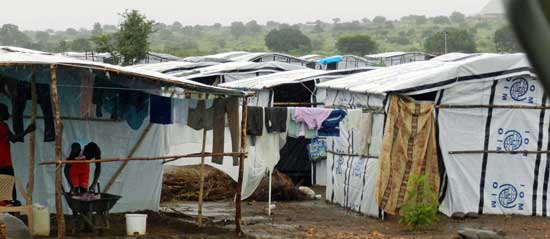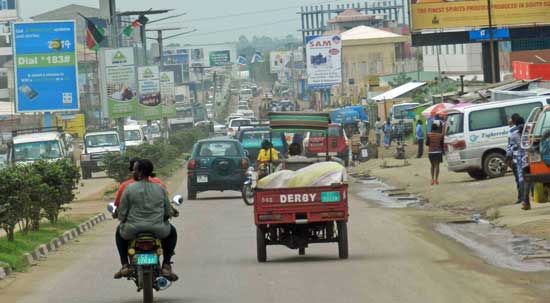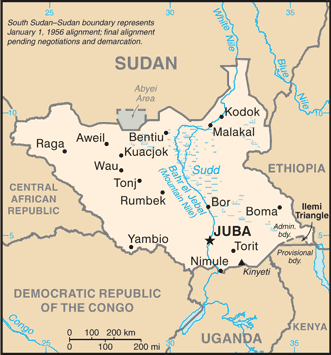
The premier report on the "Status of Global Mission" is currently by Todd M. Johnson and Peter F. Crossing, and is published annually in the International Bulletin of Missionary Research. Click here to see our latest Global Mission Trends report, which incorporates some of those stats.
The US Center for World Mission has the excellent magazine Mission Frontiers devoted to reaching the unreached, which you can access online.
The Lausanne Covenant is a powerful statement on the nature, purpose and methods of global evangelism, formulated in 1974, and ratified by 2,300 delegates from 150 nations.
A brief word to African American Christians concerning global mission:
Before the throne will be gathered folk from every "tribe and language and people and nation" (Revelation 5:9, NIV), purchased by the blood of Christ. We have been given the ministry of reconciliation, with orders to make disciples of ALL nations (ethnic groups). We don’t have the luxury of staying in our own neighborhoods, however needy they are.
 We are to spread of the Gospel to all ethnic groups. Christ gave all of us the "Great Commission" to go to "all nations" (Matt. 28:18-20). This is to make disciples, baptizing and teaching them all that Christ has taught. The only command is "make disciples." Going into all the world, however, costs money. Money is not evil; the love of money is the root of all sorts of evil (1 Tim. 6:10).
We are to spread of the Gospel to all ethnic groups. Christ gave all of us the "Great Commission" to go to "all nations" (Matt. 28:18-20). This is to make disciples, baptizing and teaching them all that Christ has taught. The only command is "make disciples." Going into all the world, however, costs money. Money is not evil; the love of money is the root of all sorts of evil (1 Tim. 6:10).
Acts 1:8 tells us to witness to Christ in Jerusalem, Judea, Samaria and to the uttermost parts of the earth. This does not mean that each level depends upon everyone being evangelized at the lower level, or we would never get to the higher levels. If we cannot personally go, then we can personally support those who do go.
Examples of support:
What a missionary is NOT:
We should send out those who are missionaries for the sake of the Name of Christ, "in a manner worthy of God." (3 John 1:5-8), because unbelievers cannot be expected to support them.
Is the responsibility to give everyone a chance to receive Christ and be discipled the responsibility of the White, or the Korean, or the Hispanic church alone?
Why this list? It’s a simple, last-minute checklist to make sure that you have the “essentials.” Some items are luxuries.
To carry on your person or in carry-on for the flight:
Pen, small tablet or large lined sticky notes, prescription drugs, ear plugs, eye shades, travel-size deodorant, breath freshener/travel toothbrush & paste, reading glasses, travel pillow, copy of photo page of passport, address and phone number of destination. In concealed travel pouch should be your tickets, passport, debit/credit cards, and currency. Of course, if you bring a camera, a laptop computer, or a video projector, they should be carried with you, not as checked baggage.
For more difficult village living conditions (such as Sudan):
The MRS AutoFlow Gravity Filter is an excellent and easy filtration system (Campmor.com), Lipton “cup of soup”; salted nuts; beef jerky; Gatorade; trail mix; protein bars; fly strips (sticky) for flies. A “solar shower" is useful, but our Team does not need one.
A laptop?
Pros: you can dump pictures from digital cameras onto the hard drive and burn CDs to share pictures before the team disperses. A universal USB media card reader is useful. You may need an extra laptop battery. It's useful for projector presentations and to record expenses on a spreadsheet. You can teach and preach from it without the need of a printer.
Cons: it is a target of thieves, so you always need to protect it. You may be in situations where you cannot recharge it, unless you have access to a generator or solar charger. If weight is very critical, either don’t bring it, or distribute extra weight to other Team members, if possible.
Checked Baggage
Delta/KLM is our current preferred carrier from the USA to Entebbe, Uganda, via Amsterdam. Arrival and departure times for Entebbe are excellent, and layovers in Amsterdam either minimal or reasonable, and the airport has many amenities including a mini art gallery and tables with power supply.
British Airways allows 3 checked bags under its humanitarian fare, which is a great help getting items to the field. Their fares generally do not fluctuate very much seasonally, as other airlines do, so this has an advantage during summer flights to Africa, which is the high season. It's often possible to avoid overnights in London. And they have a good Starbucks at Heathrow.
Check with Delta concerning size and weight regulations and possible charges. Typically we're allowed a maximum of two bags not exceeding 50 lbs., with bags of combined dimensions of 62 inches. Team members are responsible for baggage expenses. Carry-on bag dimensions should not exceed 45 inches. Team members are responsible for possible baggage charges.
Each Christian is commanded, not invited, to support ministry to all the world. We can go, or pray and give. As we go Jesus never leaves Us (Matt. 28:19-20). Today the division between home and foreign missions is increasingly blurred. This is especially true concerning minorities living in the US. Jonathan Bonk has said that everyone who was ever born was born on the mission field. Each people and culture is up for grabs as a mission field, with EVERY generation.
The issue is, where and how does God want me to serve Him? If He has us, WHERE we serve is a minor issue.
God wants us to be faithful to our place of service: "Martin Luther said, 'If I profess with the loudest voice and clearest exposition every portion of the truth of God except precisely that little point which the world and the devil are at the moment attacking, I am not confessing Christ, however boldly I may be professing Christ. Where the battle rages, there the loyalty of the soldier is proved and to be steady on all the battle front besides, is mere flight and disgrace if he flinches at that point." (quoted by Francis Schaeffer, The great evangelical disaster, The Complete Works of Francis Schaeffer, Vol. 4:333).
Here are testimonies of the impact of short-term mission trips
Thank you for wanting to serve Christ in Uganda! Please let us know how we may better serve you. We do not promise you a comfortable or an easy trip, but we do offer you ministry opportunity among a needy, receptive people and a chance to see the hammer-stamp imprint of the faithfulness of our King in an “uttermost” part of the world. You will also likely learn much—perhaps about worship, contentment, yourself and the Spirit of God.
The information in this manual is Uganda-specific and designed for both team-leader and team-member use. We want to make your trip as effective as possible. Reflections upon many trips to Uganda are condensed for your assistance. Keep in mind that some suggestions reflect our comfort levels. You will not need everything suggested. You’ll find great information and links at sites maintained by Bob Hayes and by Barry McWilliams. Check also our Uganda page for short-term Team forms and Uganda information. If you don’t personally have an email address or access to the Web, try to obtain it. Otherwise make friends quickly with someone who does. Such access speeds transfer of Team and personal information both before departure and while in Uganda, and provides access to tremendous resources.
Northern Sudan and South Sudan: Two Separate Countries
By James Yugu Yangkole
1. Northern Sudan
Until the conquests of Mohammed Ali Pasha from 1821 (for Northern Sudan) to about 1869 (for Southern Sudan), Sudan did not exist as one political entity. The Northern Sudan, up to that point in time, was divided into two loosely knit separate entities: the riverain areas of Central and Northern Sudan and Kordofan as one entity under the Funj Kingdom and Darfur as another separate kingdom. The Two kingdoms were eventually united by religion, language and the Turko-Egyptian conquest and administration.
2. Southern Sudan
Up to the middle of the 19th century, South Sudan, in its known geographical expression and complex, did not share a political entity with Northern Sudan. The Sudd, the Nile System, the forests and a hostile climate effectively shielded off the South from the Arab invasion and Islamic-Arab assimilation. The Shilluk then dominated the White Nile with their canoes; the Nuer and the Dinka contained the Baggara Arabs in the North and the West, when both sides could only use spears and clubs. But with the invention of the sailing boat and modern arms, the Southern tribes became ill equipped. This enabled Mohammed Ali’s agents to penetrate South Sudan, thus exposing the people of South Sudan to the great dangers they had been resisting for well over 150 years.
3. Consequences of Mohammed Ali’s Success
The conquest of South Sudan offered an opportunity for the extension of the ancient Arab-Islamic frontier to continue a forced “civilizing process” of Islamic and Arab assimilation in South Sudan and beyond. This process now appears as “the civilization project,” the comprehensive propagation of Islamic faith and religion, the education system, the public control of mass media and the government-controlled humanitarian work and general governmental protection.
4. The Traditional Rulers of Sudan
The people who have been ruling the Sudan since 1/1/1956 are known as Jellaba. They are a social group which have developed since the fourteenth century from elements of foreign and local traders. They have established themselves in trading centers that later became important urban centers and towns like Dueim, Omdurmara, Sennar, etc. A hybrid of different races, and nationalities from the indigenous Africans and the immigrant Arabs, Turks, Greeks and others, they interacted and intermarried in the long historical process which took place mainly in the riverine Northern Sudan. It is hard today to trace the original inhabitants of the riverine areas and the Gezira. They have undergone a precise and complete assimilation. The Jellaba were better prepared to inherit the political and state power in 1956. They were also developed and aided by the colonial regime to assume power when direct colonialism became untenable. As such the independence was an affair between the Anglo-Egyptian colonial regime and the Jellaba. The South was not consulted.
The tragedy of the Jellaba is their narrow Arabo-Islamic outlook and their total failure to look beyond these two parameters of Arabism and Islamism as the sole uniting factors for the Sudan The Jelluba have set up an economic system which is responsible for the deepening of the inherited disparities among the regions of the Sudan. The funds and other resources of the marginalized areas were always transferred and invested in the Jellaba areas of Central Sudan.
5. Response of South Sudan
The South has drawn clear lines to resist the forced assimilation. Despite the heterogeneous nature of the people of South Sudan, regional nation has been expressed in armed movements (the Anyanya in the 1960s and the Sudan People’s Liberation Movement from 1980-s to date), formation of Southern political parties (the Liberal Party, the Federal Party, the Southern Front, Sudan Africa National Union and Union of Sudan African Parties) to mention but a few. The people of South Sudan reject the imposed unity. They are aware their assimilation means forever assigning them to the tasks of “hewers of wood and drawers of water.”*While we have excellent reason to affirm and publish these reports, because of only very limited knowledge of the situation, RMNI is not responsible for the accuracy of this report in every particular.
Request a contact about going on or supporting a short term missions trip!

2025 PDF Flyer: Ministry Opportunities in S. Sudan!
How to get to South Sudan - Find out how you can go with us to Sudan--here is your first stop.

S. Sudan Trip Essentials - The basic information about the trip: costs, needs, etc.
Application - The earlier your application is received, the better your preparation will be.
Waiver of Liability - The waiver must to be notarized, so don't wait.
Quick Gear Listing - The list of things you will want on the trip.
South Sudan Visa Application (updated 15Nov2018)
Uganda Visa Information (updated 7 Feb 2021)
Vaccines and Medicines for South Sudan
World Fact Book - South Sudan Home Page (updated 7 Feb 2021)
World Christian Database--South Sudan Todd M. Johnson, ed. World Christian Database(Leiden/Boston: Brill, last accessed March 25, 2019).
Republic of South Sudan, National Bureau of Statistics

Page 3 of 3